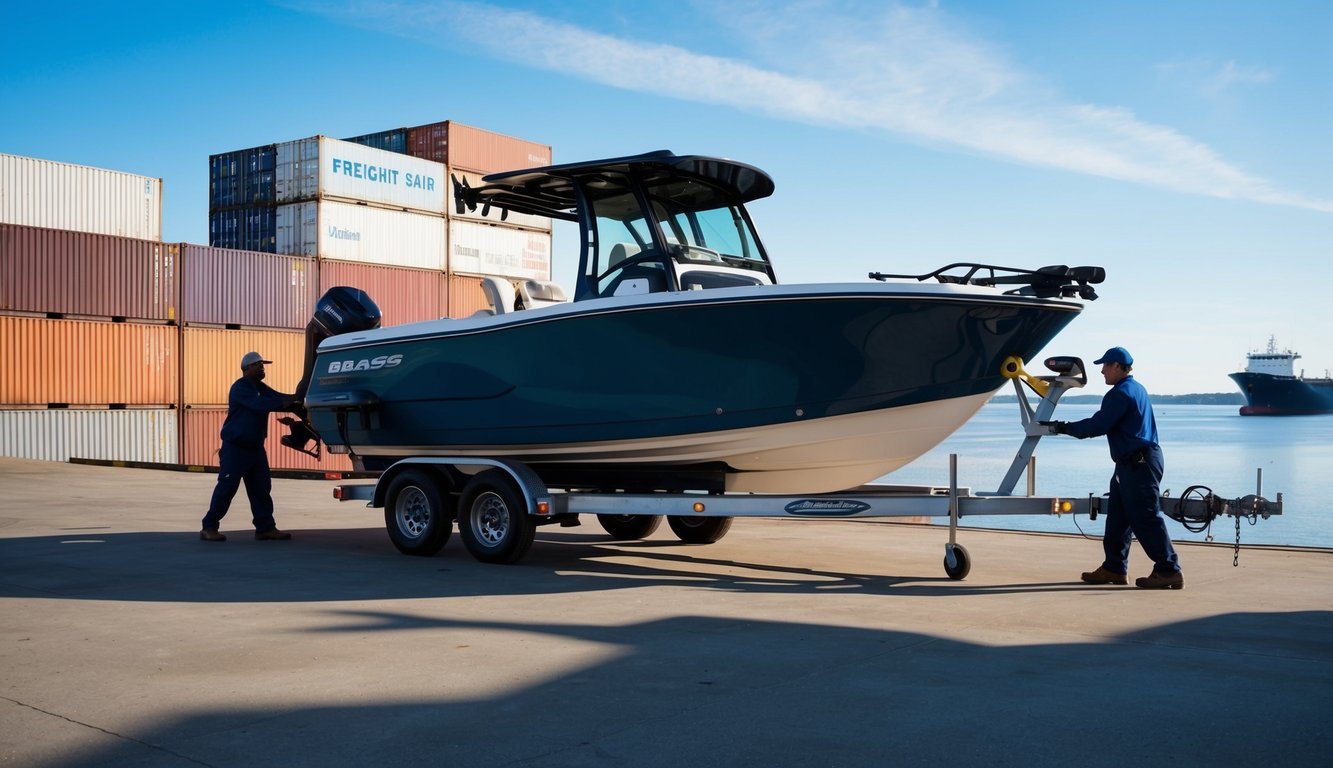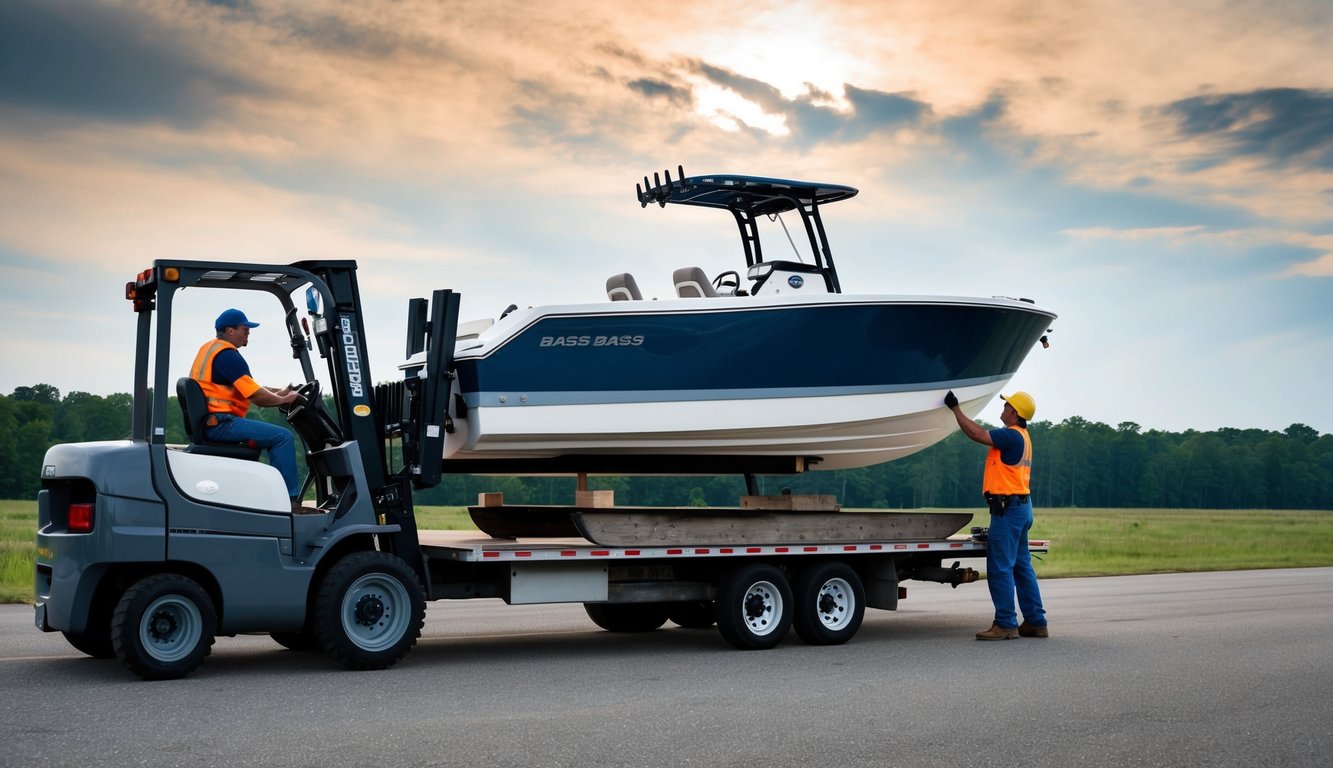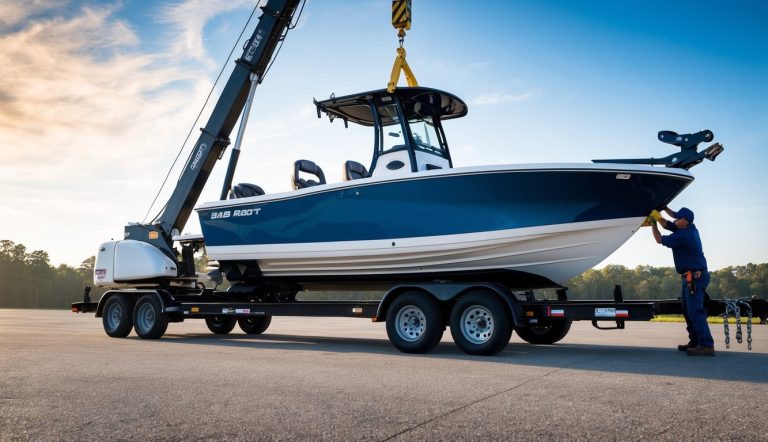Understanding Shipping Costs for Bass Boats
Shipping a bass boat involves several factors that affect the final price you’ll pay. Most transporters charge between $1.00 to $1.50 per mile for standard bass boat transport, though rates can vary significantly.
Types of Bass Boats: Aluminum Vs. Fiberglass
- The material of your bass boat significantly impacts shipping costs. Aluminum bass boats typically weigh less than fiberglass models, often resulting in lower transport fees. A 16-foot aluminum boat might weigh around 1,000 pounds, while a similar-sized fiberglass model could weigh 1,500 pounds or more.
- Fiberglass boats offer durability and smoother rides but cost more to ship due to their weight. These boats typically command higher shipping rates, sometimes reaching $2.00 per mile for larger models.
- Your boat’s dimensions also matter. Wider boats (over 8.5 feet) require special permits and equipment, increasing costs. Extra-long boats may need specialized trailers.
- Distance is another key factor. Cross-country transport (like South Carolina to California) will cost significantly more than regional moves. Some companies offer volume discounts for longer distances.
- For the most accurate quote, provide transporters with precise measurements, weight, and photos of your bass boat.
Factors Influencing the Shipping Cost

When planning to transport your bass boat, several key elements affect the final price you’ll pay. Understanding these factors helps you budget accurately and avoid unexpected costs.
Boat Size and Weight
- The dimensions and weight of your bass boat significantly impact shipping costs. Larger and heavier boats require more resources to transport safely. Most transport companies charge based on a combination of length, width, and weight.
- A standard 16-foot bass boat will cost less to ship than a 21-foot model. Boats exceeding standard dimensions (over 8.5 feet wide or 13.5 feet tall) may be classified as oversized loads, requiring special permits and equipment.
- The dimension weight of packages affects pricing structures. Many carriers charge between $1 and $2 per mile for standard-sized bass boats, but this can increase substantially for larger vessels.
- Your boat’s weight also determines the type of transport equipment needed. Heavier boats require more powerful trucks with greater towing capacity and fuel consumption.
Distance of Transport
- The shipping distance plays a crucial role in determining your final cost. Longer routes naturally cost more, but the price per mile typically decreases as distance increases.
- For shorter trips under 500 miles, you might pay a premium per-mile rate. For journeys over 1,000 miles, the rate often drops significantly. According to industry standards, boat transport costs typically range from $1-$2 per mile, with variations based on distance.
- Cross-country shipping (coast to coast) generally falls between $2,000-$5,000 for standard bass boats. Regional shipping costs less, with 800-mile journeys averaging $800-$1,600 depending on your boat’s specifications.
- Fuel costs directly impact transport prices. When fuel prices rise, expect shipping quotes to increase accordingly.
Shipping Options and Services
The type of transport service you choose significantly affects your final price. Standard options include open transport (less expensive) and enclosed transport (more protection but higher cost). Expedited shipping comes at a premium but ensures faster delivery. The delivery speed you require will directly impact the price you pay. Standard delivery times typically range from 1-3 weeks depending on distance.
Additional services like insurance coverage, loading/unloading assistance, and tracking capabilities add to the base price. Most transport companies offer insurance, but coverage limits vary widely. Professional boat transport companies typically include basic services like securing the boat and standard insurance in their quotes. Premium services might include:
- Door-to-door delivery
- GPS tracking
- Custom scheduling
- Additional insurance coverage
- Professional preparation (shrink-wrapping)
Choosing the Right Transport Company

Selecting a reliable transport company is crucial for safely shipping your bass boat across the country. Your choice directly impacts cost, delivery time, and peace of mind during transit.
Service Comparison
When comparing boat shipping services, request quotes from at least three companies to understand market rates. Current boat shipping costs typically range from $1.00 to $1.50 per mile, though prices can reach up to $3.67 per mile for specialized transport. Some reputable companies charge starting rates of $4.00 per mile for legal-sized vessels.
Look for companies with specific bass boat transport experience. Many transporters offer different service levels:
- Standard Transport – Most economical, longer delivery window
- Expedited Service – Faster delivery, higher cost
- White Glove Service – Premium handling with extra protection
Customer Service and Reliability
A transport company’s customer service quality often reflects their overall reliability. Check for responsive communication before booking. Representatives should answer your questions thoroughly and provide clear information about pickup, transport, and delivery procedures.
Read online reviews across multiple platforms. Look specifically for feedback about bass boat transportation experiences. Pay attention to comments about:
- Timeliness of pickup and delivery
- Communication during transit
- Condition of boats upon arrival
- How problems were resolved
Request references from each transport company and contact previous customers directly. Ask about their satisfaction with the service and whether they encountered any unexpected issues.
Insurance Coverage Options
Never ship your bass boat without adequate insurance protection. Reputable transport companies offer comprehensive coverage options to protect your vessel during transit.
Ask these key insurance questions:
- What is the coverage limit?
- Does it include protection against scratches, dents, and water damage?
- What is the deductible amount?
- Is there additional coverage for high-value equipment?
Request written documentation of all insurance details before signing a contract. Many companies offer basic coverage included in their rate, with premium options available at additional cost. The proper insurance should cover the full replacement value of your boat. Consider adding your boat to your personal insurance policy during transport for additional protection. This provides a safety net if you need to file a claim against the transport company’s insurance.



